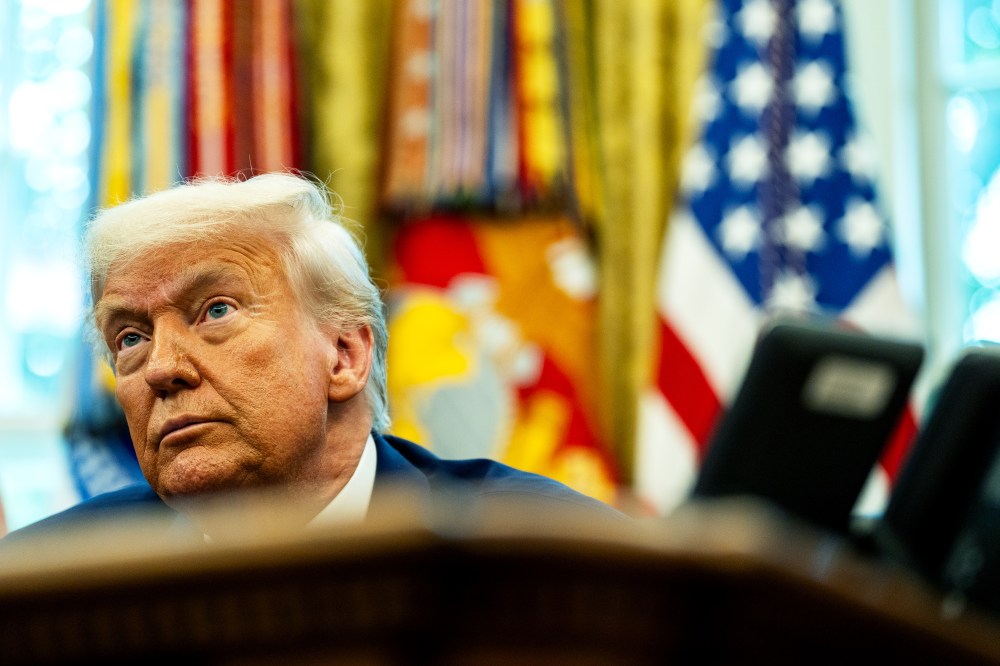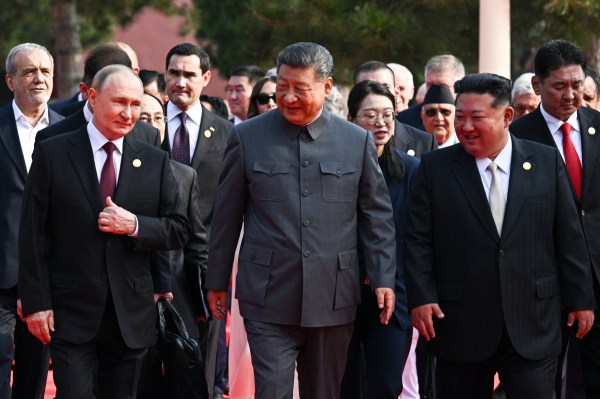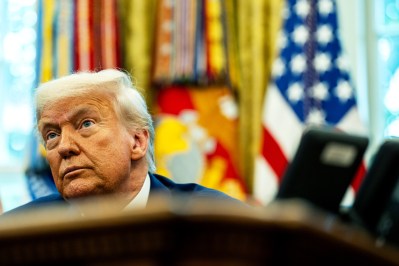Did Paramount do the right thing by agreeing to bribe the president?
By “the right thing,” I don’t mean the morally or ethically proper thing. The answer to that is as obvious as it is irrelevant in modern America. I mean the right thing from a business standpoint. Have we already reached the stage in Donald Trump’s second term where bribery is simply responsible corporate practice?
Last night, Paramount agreed to settle a lawsuit filed by Trump under a Texas statute that prohibits certain forms of false advertising. The supposed “false advertising” in this case originated with an interview that 60 Minutes conducted with Vice President Kamala Harris last October. (The show airs on CBS, a subsidiary of Paramount.) One of her answers that made it to air was edited to make it more concise. CBS News claimed that was done because of time constraints; Trump claimed it amounted to deliberate “news distortion” designed to “deceive” the public into thinking that the Democratic candidate was more competent than she was.
Amazingly, this isn’t the only lawsuit Trump has filed seeking election-related damages in a state where he won by double digits in a national election he ultimately won comfortably.
As a non-paying reader, you are receiving a truncated version of Boiling Frogs. You can read Nick’s full newsletter by becoming a member here.
His 60 Minutes claim would have been laughed out of any court in the country because the First Amendment grants publishers broad legal protection for their editorial decisions. Imagine what America would look like if news outlets faced jury trials and financial penalties every time they edited content in a way that arguably misled their audience. Populist media would be out of business in an hour.
In other words, Paramount had a slam-dunk defense—but chose to settle with Trump anyway for $16 million, most of which will go to his, ahem, presidential library. Coincidentally, Paramount also has a merger pending that requires the approval of his administration. Fight or flight: What would you have done if you needed to curry favor with a head of state who’s proudly vindictive and more than willing to abuse regulatory power to settle a personal grudge?
As it happens, $16 million is identical to the amount Trump received in December when he reached a settlement in another questionable media lawsuit that the other party probably would have won. And according to the New York Times, that too is no coincidence:
The size of the settlement, $16 million, is the same sum that ABC News agreed to pay in December to settle a defamation case filed by Mr. Trump against the network and one of its anchors, George Stephanopoulos. Paramount’s board was concerned that paying a higher amount to settle the case could increase the company’s exposure to potential legal actions from shareholders accusing them of bribery.
You can (and should) despise Paramount for sacrificing the integrity of its news operation to a corrupt bully to make a buck. But as a business matter, the company faced a bona fide conundrum.
Refusing to pay Trump would have likely led to its merger being blocked, costing shareholders billions—but agreeing to pay him has placed Paramount at risk of being sued by some of those same shareholders for bribery. Every corporation in America is now wondering: What’s the “sweet spot” in letting oneself be extorted by the president? Is $16 million the magic number, defensible in court because there are now multiple precedents for it? What if he demands more?
To bribe or not to bribe: When voters turn their country into a banana republic by making a gangster president, kickbacks become part of the cost of doing business. If I were a CFO in 2025 in need of government approval for some new project, I’d feel obliged to allot a certain amount of the budget for a “donation” to the Donald J. Trump Presidential Library and Casino.
But the funniest thing about all of this? Not everyone who pays a bribe gets a favor in return.
Money for nothing.
In fact, the list of people who haven’t been rewarded for paying off Trump may be longer than the list of those who have.
I mentioned a few in this piece. Tim Cook of Apple and Mark Zuckerberg of Facebook each courted the president during the transition period, fat envelopes and all. (Zuckerberg paid a more lavish bribe dressed up as a legal settlement than ABC News or CBS News did.) For their trouble, Cook got slapped with a threat of 25 percent tariffs on foreign-made iPhones, and Zuckerberg received no relief from an antitrust suit filed by the Federal Trade Commission.
The list has grown since then. In May, for instance, the president hosted a private dinner for major investors in his memecoin, one of the most preposterously shady pay-to-play scams in the history of the presidency. Except, apparently, there wasn’t much play: Most of the crypto bros who’d spent big bucks expecting face time with Trump got a short speech and some terrible food in return. Only the biggest investors in the coin received a personal audience.
The most notable new addition has to be Elon Musk, who showered the president with nearly $300 million in campaign spending last year in the apparent hope that he’d gain influence over policy in a new administration. After a few months atop DOGE, however, he’s now on the outside looking in as Trump’s agenda turns into Silicon Valley’s worst nightmare: high tariffs, full-spectrum hostility to immigration, and a kulturkampf against renewable energy. At last check, the president was threatening to “take a look” at denaturalizing and deporting Musk and to have DOGE review his contracts with the government.
All Elon got for his mega-bribe was an increase in impoverished children dying and a nagging sense that some of his behavior as a Trump deputy perhaps “lacked empathy.”
The latest party to find less return than expected on its investment in making Trump happy is Ukraine. Our new “America First” administration doesn’t do charity, even when most of that “charity” is being spent in the U.S. and is helping the recipient to devastate a rival that’s threatened U.S. interests for most of the last 80 years. Ukraine had to find a way to make it worth Trump’s while to keep sending military aid. So it did—handing him a “win” by signing a deal he’d demanded to give the United States a stake in the country’s mineral wealth.
This morning, that country woke up to find that the U.S. had halted shipments of certain weapons anyway, some of which were already in nearby Poland. Among them are dozens of Patriot missiles, which Ukraine urgently needs to fend off escalating Russian air attacks.
The White House might have a good reason to pause those shipments. Supposedly, U.S. stockpiles of those weapons are running low; Patriot missiles in particular might plausibly be in short supply after they were used last week to defend our base in Qatar from an Iranian attack. Clawing back shipments from Ukraine might be a justifiable case of putting America first.
But Ukraine hawks are skeptical, and you can see why. For one thing, the sheer variety of weapons—some offensive, others defensive—makes it hard to believe we’re facing shortages of each simultaneously. For another, the man behind the decision is reportedly Undersecretary of Defense Elbridge Colby, who’s spent years calling for the U.S. to pivot militarily away from Europe and toward China and the Far East. (Spoiler: An isolationist GOP isn’t going to defend the Far East from China.) This smells less like a genuine supply problem, in other words, than doves in the administration using allegations of a supply problem as a fig leaf to fulfill their dream of Ukrainian capitulation.
If the supply problem is real and we can’t afford to supply Ukraine any longer, the obvious thing to do would be to finally, finally impose new sanctions on Russia and the countries that persist in purchasing its oil. Doing so would be politically popular and would make strategic sense. Without U.S. arms for the Ukrainians, after all, Vladimir Putin has every incentive to press on; only by raising the cost of keeping the war going can the White House change that incentive and secure peace. In lieu of donating military weapons, America could and should use economic ones.
So why hasn’t it? Why isn’t the Ukraine weapons clawback being accompanied by those new sanctions we’ve spent so many months hearing about? For that matter, why hasn’t the Trump White House requested new aid from Congress for the Ukrainians now that it has that minerals deal it was after?
What did Kyiv get for handing over a cut of its ore deposits?
Maybe the Ukrainians should have bought a billion dollars’ worth of Trump’s memecoin instead. This may be a rare occasion in which the famously corrupt government of Ukraine wasn’t corrupt enough.
Quid pro quo?
No one better understands the appeal of a quid pro quo to the president than Volodymyr Zelensky, but bribes in Trump’s second term actually seldom work that way.
Rarely does he do one-for-one transactions in which favors are purchased directly. I doubt, for instance, that Paramount received any solemn promises that its merger would be approved.
Rather, bribes under Trump 2.0 typically take the form of either “cover charges” or protection money.
Ukraine paid a cover charge when it acquiesced in the president’s demands for minerals. It was at risk of losing access to the White House (literally!); the deal it struck with him got it past the velvet rope and back in a position where it could lobby him directly for aid.
But that didn’t guarantee that it would receive aid, any more than paying a cover charge at a club gets you free drinks once you’re inside. You’re paying for access. Everything else is extra.
Paramount, on the other hand, is paying protection money. It doesn’t need “access” to anyone to have the FCC consider its merger. What it needs is for Donald Trump not to break its proverbial legs by rejecting that deal.
Like Ukraine, Paramount is not guaranteed to receive something in return for its payment, any more than a neighborhood business owner receives anything when the local hoodlums come to collect their monthly fee. What that business owner, and Paramount, “receive” is simply the right to go on conducting business unharassed. The merger now might be approved on the merits; absent Tuesday’s settlement, the merits would never have been reached.
I suspect some courtiers, like Cook and Zuckerberg, viewed their bribes both ways. The president’s relationship with “woke” Big Tech was so chilly historically that the two must have assumed they’d lose access to government if they didn’t start greasing palms, and might very well have had their corporate legs broken by a vengeful Trump if something happened to further antagonize him.
They may not be receiving favors from the White House, but they’ve at least been spared the “horse’s head in the bed” treatment that Harvard is experiencing.
Lest you doubt that the Paramount settlement was a bribe, consider the fact that it included no apology by the company for how 60 Minutes edited its interview with Kamala Harris. CBS News would cite that as evidence of integrity—we refused to admit wrongdoing—but it isn’t. It’s a tacit acknowledgement by both sides that this was bribery, not recompense for a legitimate injury. In the end, Trump cared more about $16 million than about a confession of liberal bias, and Paramount cared more about making the president happy than about standing on its principles when it admittedly isn’t at fault.
My sense is that this problem is getting worse over time, not better.
There’s room for debate on that. One Dispatch colleague told me that the settlement felt anachronistic to him in that presidential shakedowns seemed more common in, say, February than they do now. That’s hard to quantify, although it adds up: Trump’s job approval has dropped since then, and some of his critics have temporarily bested him in court, which should logically encourage resistance. In some cases, his own tactical incompetence has incentivized elite institutions to stop rolling over for him so quickly.
But it’s hard to reconcile the idea that he’s lost leverage to bully private actors with my sense that he’s threatening his enemies more frequently lately. Republican enemies, business enemies, foreign enemies, media enemies: He’s throwing roundhouses at everyone. He’s threatened to wreck Elon Musk’s business. He’s threatened to withhold aid from Israel if it prosecutes Benjamin Netanyahu for corruption. He’s threatened to use the “levers” he controls as president to interfere with Zohran Mamdani’s potential administration of New York City. He’s threatened to deport U.S. citizens, and not for the first time.
His deputies are getting more brazen, too.
A new app available for smartphones relays to users reports of ICE activity happening nearby. It explicitly warns them not to harm or interfere with the agents; the point is to tip off illegal immigrants in the area to lie low. Even so, Attorney General Pam Bondi publicly warned the app’s developer this week that the Justice Department is “looking at him, and he better watch out, because that’s not protected speech.” Homeland Security Secretary Kristi Noem went one step further, suggesting that CNN might be prosecuted for merely reporting about the app.
Perhaps a contribution by the network to the Trump presidential library will solve its problem.
A matter of conscience.
The Paramount settlement does seem anachronistic, but I doubt it’s because Trump and his team have lost the political capital needed to extort enemies.
More likely, they’re striking fewer of these deals lately either because the lowest-hanging fruit among their targets has already been picked or because certain bribes are now being paid in advance, in ways that are less visible than formal legal settlements. It would be wildly out of character for the president to have discovered in February that he can use executive power to coax bribes out of his antagonists and then grow gun-shy about doing so. I frankly can’t think of anything that’s happened since January 20 that might plausibly have caused him to question his own sense of impunity.
He’s learned that rights, such as a TV network’s right to edit an interview with Kamala Harris as it sees fit, exist on paper but don’t exist in practice if you can make it painful enough for people to exercise them. That he’s willing to keep litigating his extortion attempts despite the fact that he’s lost a number of them in court demonstrates his abiding commitment to bribe-taking. He’s using the legal process itself as a form of punishment for those who resist being shaken down. Harvard might win every battle with the Trump administration in court, yet still decide that, all things considered, surrender is the least bad option.
Ultimately, there are only two reasons not to pay Trump when he’s looking to have his palm greased. One is personal dignity, of which elite American institutions (and Americans) are in short supply, and the other is the dignity of the individual clientele to which those institutions cater. If presidential bribery has momentarily risen to the level of responsible corporate practice, customers of firms that resort to it can make it irresponsible by voting with their wallets. In a country that cares only about the bottom line, lowlife organizations like Paramount will not be reasoned into behaving more ethically—but they might be extorted into it.








Please note that we at The Dispatch hold ourselves, our work, and our commenters to a higher standard than other places on the internet. We welcome comments that foster genuine debate or discussion—including comments critical of us or our work—but responses that include ad hominem attacks on fellow Dispatch members or are intended to stoke fear and anger may be moderated.
With your membership, you only have the ability to comment on The Morning Dispatch articles. Consider upgrading to join the conversation everywhere.